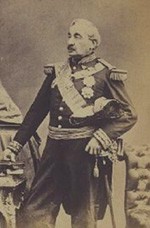Cousin-Moutauban was born on 24 June, 1796, the son of Jean-Antoine Cousin-Montauban and Appoline de Launay. In July 1814 he volunteered for and was admitted into the Gardes du corps de Monsieur (the King's brother's personal guard corps), and on 13 December, 1815, he made Second Lieutenant in the 3e régiment de cuirassiers. In 1820, he was seconded to the general staff's école d'application, and in 1822 he was made a lieutenant in the “chasseurs de l'Orne”, and subsequently in the 10e de ligne. A year later, he was appointed to the post of batman to General Vicomte Toussaint, in the Armée des Pyrénées, before serving as a staff officer – with the rank of lieutenant – in the 1er régiment de grenadiers à cheval de la garde royale. He subsequently served in the Chasseurs d'Afrique and in the Spahis d'Oran.
On 6 July 1841, whilst stationed in Algeria, he was severely wounded on the Chétif plain: “Amongst the twenty-eight injured is the intelligent and intrepid cavalry major Cousin-Montauban, of the Spahis. With his own hands he killed several enemies at the head of forty cavalry riders, who, on their own, made up the cavalry column; the day after the action which brought an end to the combat, he received a bullet to the chest.” He remained stationed in Algeria until 1849. On 24 September 1851, the Prince-President promoted him to general and placed him in the governor of Algeria's service, assigned to operations in the Oran region. In 1854, he was hospitalised in Vichy following liver complications and did not participate in the Crimean campaign. On 28 December 1855, he was named Division General, in command of the subdivisions of Limoges, Tours and Rouen.
With diplomatic relations between China and the French Empire rapidly deteriorating – the nadir coming with the Chinese bombardement of Franco-British ships en route to Peking (Beijing) in June 1859 – the French emperor decided to dispatch an expeditionary corps to the far east. On 13 November 1859, Cousin-Montauban was named commander in chief of the French army and naval forces for the expedition. The force comprised 8,000 men, structured into two brigades under the direction of Generals Jannin and Collineau. On 1 August 1860, an initial combined allied force landed at Beitang and by 2 September, Tien-tsin had been occupied.
On 21 September, the important bridgehead at Baliqiao was captured by allied forces, leaving the route to Peking open. What followed was the famous capture and pillage, by Franco-British troops, of the Chinese emperors' Summer Palace at Yuánmíng Yuán. Cousin-Montauban was awarded the title of Comte de Palikao in recognition of his role on the expedition and in the battle, but the pillaging of the palace was to prove decidedly damaging to his hopes of being named maréchal. The Corps Législatif also refused him an allowance of 50,000 Francs. However, on 6 March 1861, he was appointed senator. Named Minister of War in Emile Ollivier's cabinet on 9 April 1870, on 9 August he assumed the government leadership following the empress's request. His career came to an end with the fall of the empire.
It was not until May 1863 that the justice minister authorised him to change his name, from Cousin-Montauban to Cousin de Montauban. Having already been made comte de Palikao by the French emperor following the success of the expedition to China (imperial decree dated 22 January 1862), that title became hereditary in May 1863. Inducted into the Légion d'honneur as chevalier in 1834, he was subsequently promoted to officier in 1844, commander in 1848, grand officier on 28 December, 1859, and finally grand-croix on 28 November 1861. On 26 November 1861, he was presented with the Médaille militaire, the supreme award for leadership.
He received the Crimea Medal from Queen Victoria, was appointed member of the Order of St. Gregory the Great, the Order of the Bath, and the Svärdsorden (the Swedish Order of the Sword). He died in Paris, at his home at 75 rue du Faubourg Saint-Honoré, on 8 January 1878.
Bernard Petit (tr. & ed. H.D.W.)
The original article is taken from the Dictionnaire du Second Empire, 1995, and is translated with permission of the publishers Fayard.


